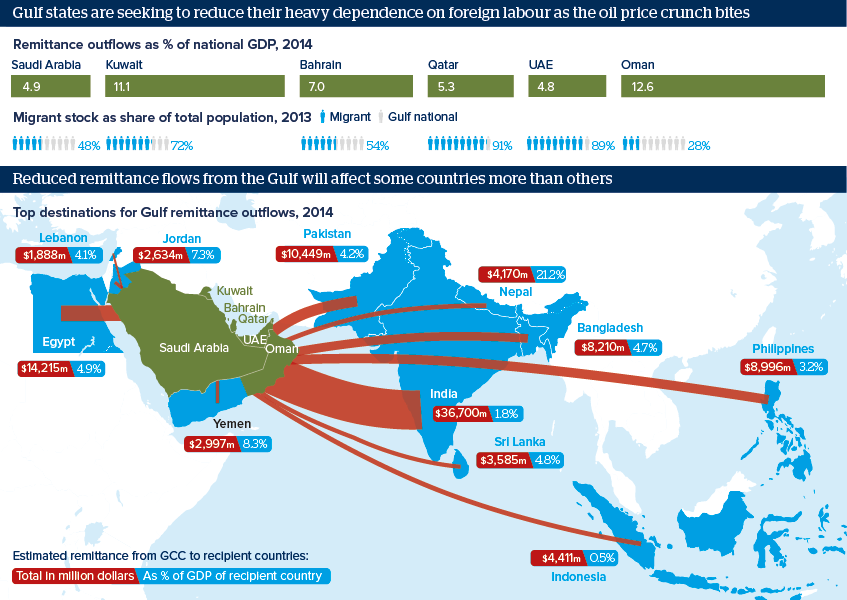Gulf cutbacks will harm migrant worker countries
Remittances are a major revenue source for poorer countries in the Middle East and Asia

Source: World Bank Migration and Remittances Factbook 2016
Outlook
The Gulf states are among the top destinations for migrant workers worldwide. The oil boom and the Gulf's infrastructure and industrialisation programmes have caused a rise in foreign labour in recent years, drawn mainly from other Arab states and Asia. Gulf states are one of the top sources of global remittance outflows, which totalled 98 billion dollars in 2014 (Saudi Arabia alone accounted for 37 billion dollars).
However, following the oil price crash, these flows are set to decline significantly. Gulf governments are planning to scale back migrant worker jobs and benefits as they look for ways to cut their budgets and encourage their own nationals into the private sector.
Impacts
- Reduced remittance flows will affect household consumption and investment in recipient communities in Asia.
- Falls in living standards and increased unemployment could heighten social tensions in Egypt, Jordan, Lebanon, Yemen, Nepal and Bangladesh.
- Targeting expats carries minimal political cost for Gulf governments, unlike cuts for Gulf nationals.
- The return of skilled labour to South-east Asia will help drive infrastructure expansion there.
See also
- Coronavirus puts Egypt tourism and remittances at risk - Mar 11, 2020
- Indonesia could again ban maids going to Saudi Arabia - Nov 1, 2018
- Qatar crisis may curtail South Asian migrant labour - Jul 28, 2017
- Gulf states’ austerity will hit foreign workers - Dec 12, 2016
- Egypt is on track for IMF loan - Sep 30, 2016
- Gulf taxation plans will not plug fiscal deficits - Jun 29, 2016
- Saudi diversification efforts look to China and India - Jun 1, 2016
- Authoritarian Bangladeshi rulers will focus on exports - Apr 27, 2016
- Saudi visit to Egypt may herald leaner times ahead - Apr 8, 2016
- India-Saudi ties balance Iran, Pakistan relationships - Apr 4, 2016
- Gulf states set for major spending cutbacks in 2016 - Jan 11, 2016
- More graphic analysis